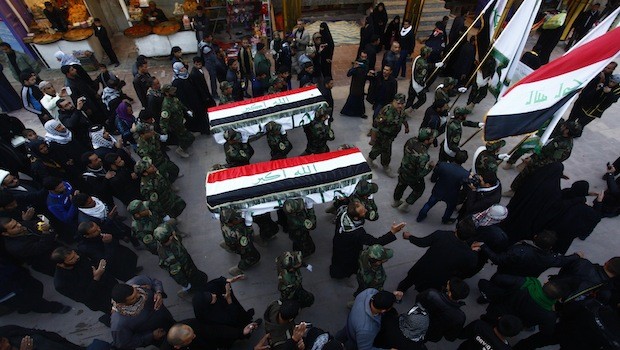
Members of Shi’ite group Asaib Ahl al-Haq, who support Syrian President Bashar Al-Assad, carry the coffins of fighters from their group during a funeral in Najaf on December 13, 2013. (REUTERS/Alaa Al-Marjani)
Baghdad, Asharq Al-Awsat—Iraqi Shi’ite cleric Grand Ayatollah Kazem Al-Haeri has issued the first public fatwa sanctioning fighting alongside Syrian President Bashar Al-Assad’s forces.
Haeri, who is based in the Shi’ite holy city of Qom, Iran’s religious capital, has many followers from Iraq who are already fighting in Syria under the wing of the Asaib Ahl Al-Haq militias, who are affiliated to Iraqi Shi’ite leader Moqtada Al-Sadr.
In response to a question from one of his followers about the legitimacy of fighting in Syria, Haeri said: “The war in Syria is not in defense of the Sayyida Zaynab Mausoleum,” a prominent Shi’ite shrine in Damascus, “but a war against infidels fighting Islam and, therefore, Islam must be defended.”
Haeri added that in comments on his official website that “fighting in Syria is legitimate, and all those who die in battle there are martyrs.”
An official in Haeri’s office confirmed that the comments were true and were officially made by Grand Ayatollah Kazem Haeri.
Ashtar Al-Kaabi, a member of the Asaib Ahl Al-Haq militias who sends Shi’ite fighters from Iraq to Syria, said there were currently around Iraqi 1,000 fighters belonging to the militias in Syria and that many more were volunteering to fight there. Kaabi told the Associated Press that the fatwa issued by Haeri “had great influence on the increase of fighters wanting to go to Syria.”
Meanwhile, the Syrian National Council, a major Syrian opposition group, said fighters from 14 Shi’ite organizations were fighting alongside Syrian government forces. Despite the fact that Iran remained the main ally of the Syrian president, the Council said these fighters come to Syria through help provided by Iraqi Prime Minister Nuri Al-Maliki.
Lebanon’s Hezbollah, which is supported by Iran, has admitted that its members are fighting in Syria alongside government forces. The organization entered the fighting in May 2013, helping the regime regain control of a number of towns along the Lebanese border.
In the meantime, Asaib Ahl Al-Haq in Iraq said that any fatwa issued by a Shi’ite cleric was only binding to the followers of that particular cleric. A spokesman for the group, Ahmad Al-Kanani, told Asharq Al-Awsat that he did not think Haeri’s fatwa “represented a call for combat alongside Bashar Al-Assad.”
However, Kanani said “the fighting in Syria aims at stopping extremists reaching Shi’ite religious shrines, which could cause sectarian sedition in the region.” He added that “we are not fighting alongside Bashar Al-Assad because we see Assad as a Ba’thist dictatorial regime, but we believe change must be achieved by other means, especially that the alternative is more extreme.”
Ayatollah Kazem Haeri is seen as one of the most prominent Shi’ite clerics and political leaders in Iraq. He is one of the main references of the Sadr Movement because he followed the father of Moqtada Al-Sadr, Mohamed Sadiq Al-Sadr, who was assassinated by the regime of former Iraqi leader Saddam Hussein. However, he is widely considered to be less influential than Grand Ayatollah Ali Al-Sistani, who is based in the Iraqi clerical city of Najaf.
Additional reporting contributed by Caroline Akoum.
